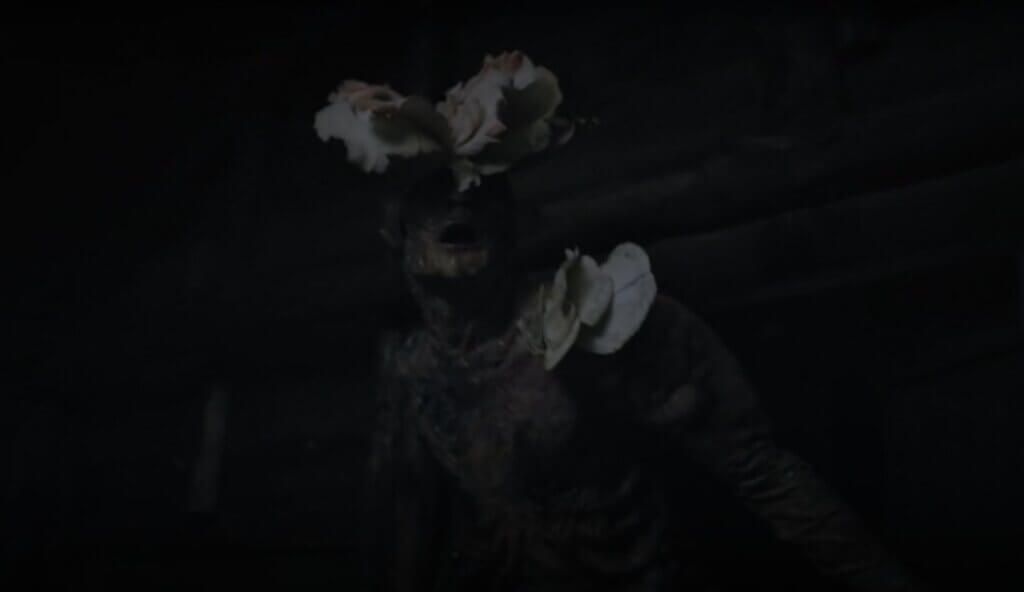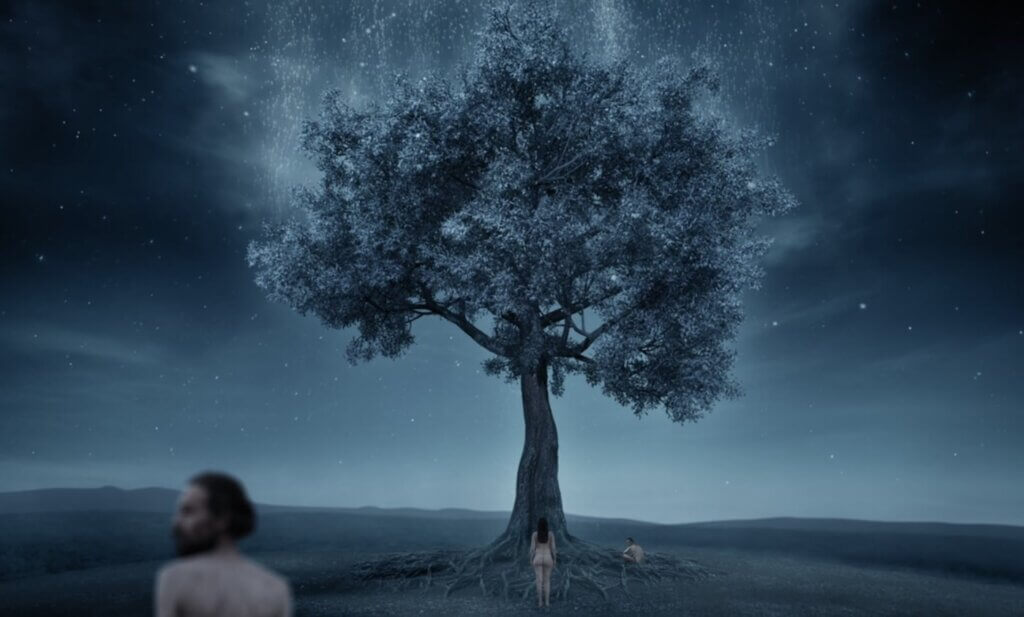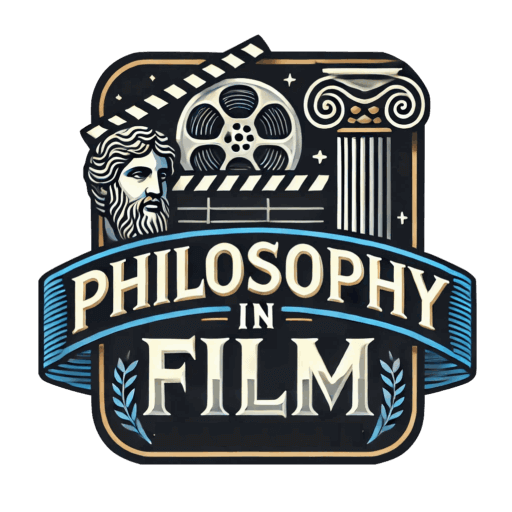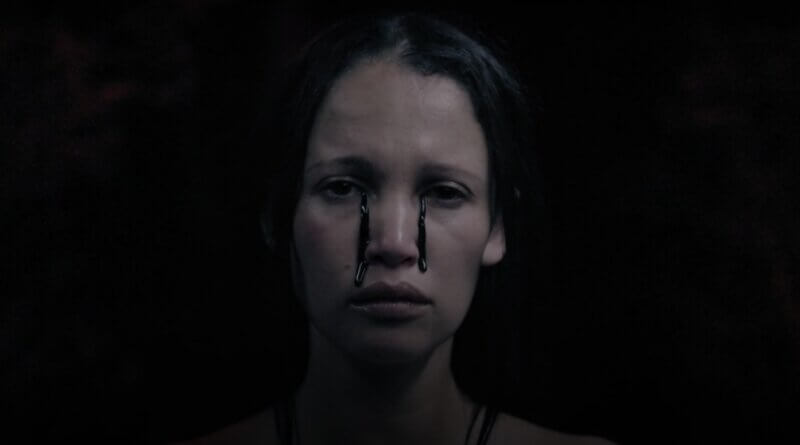Gaia (2021), A Horrific Look at the Heart of Nature and Evil
The term “Gaia” comes from the Greek Goddess of Earth, a figure that has been present in various religions and cultures throughout human history. In any case, the term itself is often linked with a sort of pagan spirituality, as well as the concept that all living things are connected to Mother Nature. This connection is put to the test (in more ways than one) in director Jaco Bouwer’s South African horror film, Gaia (2021).
Set in the forests of South Africa, two employees of the forestry service travel down a remote river, surveying the area and checking cameras set up at preset checkpoints. When Gabi (Monique Rockman) loses control of her flying drone, she insists on entering the forest to find it. Though her partner, Winston (Anthony Oseyemi), warns her against wandering off, he eventually agrees to continue checking the cameras downriver and return to meet back up before nightfall.
However, the situation turns dire when Gabi impales her foot on a crudely-made trap. Once Winston realizes that something is amiss, Gabi has already been gone for hours. He frantically reaches for his walkie-talkie, only to knock it into the water, cutting off his only means of communication with her. As day turns to night, Winston heads into the forest to find Gabi. Unfortunately for him, something seems to be lurking in the shadows. Meanwhile, Gabi stumbles upon a strange red light in the darkness, which leads her to a humble cabin in the woods.
After resting and attempting to recover from her injury, the owners of the cabin return. Barend (Carel Nel) and his nearly-mute son, Stefan (Alex Van Dyk) live a reclusive life, completely separated from the rest of civilization. Consequently, their interactions with Gail are initially hostile, though the trio comes to learn more about each other as Gail’s wounds heal. Gail’s presence also brings to light the existence of an Earth spirit, to which Barend has given his full and complete devotion, not to mention the blind, territorial, fungus-covered humanoids that roam the woods.
On paper, Gaia doesn’t seem to make much sense. However, I’ve excluded enough details so that you can still go into the film and enjoy its twists and turns in full. Despite adopting a relatively slow pace for a horror film, Gaia is extremely entertaining. More importantly, it masterfully combines elements of ecological horror, religious fanaticism, Biblical allegory, and the philosophical nature of human existence.

Gaia (2021) is a highly visual film, with dialogue being relatively sparse and mostly functional. But as we come to learn more about Barend’s devotion to the forest and the Goddess that lives underneath, the film turns from a story of survival to one of intellectual curiosity. Even though Gabi gets the chance to leave the cabin and return to her normal life, she chooses to stay. On the one hand, she wishes to save Stefan from the tyrannical rule of his father and let him experience all that life has to offer, and on the other, she wishes to learn more about the inexplicable entities that occupy the forest.
What’s particularly satisfying about Gaia is that it does not attempt to preach, at least not in an obvious way. A lesser film would draw simplistic conclusions about humanity’s overreach and nature’s resistance to our hubris. Instead, writer Tertius Kapp develops a plot that creates various dichotomies from which we might extract meaning. Humans versus monsters, father versus son, man versus monster, man versus woman, faith versus science, and so on.
And while the “monsters” of the film are, by and large, the spores that infect humans with an all-consuming fungus, there is an ever-present monster that is never really identified. As in any ecological horror film, humans show their true nature to abuse their environment and attempt to bend it to their own selfish ends, but it would be reductive to say that the monsters are just fungus and humans. The monsters are everywhere, existing to one degree or another in everything that we can see.
On this note, the film presents nature as something chaotic and free of moral obligations. Barend describes the entity living beneath the forest as something that existed “long before the apes started dreaming of gods.” As a result, he has spent his life living as close to nature and his Goddess as possible, giving complete devotion to the thing that provides him with enlightenment, though it takes human life with an almost evil detachment. Barend’s misanthropic views allow him to justify all of the violence and chaos for himself and, to a lesser extent, his dutiful son.

There are very few drawbacks in the film beyond an affinity for cliched “trick” dream sequences. On at least three or four occasions, we watch strange events unfold, only to see Gabi suddenly wake up, revealing that it was all a dream. Sometimes it’s easy to spot these moments and determine their deceit before she wakes up, but other times it’s not quite as clear. Either way, the script relies a bit too heavily on these sequences for my liking. It does allow for the film to create beautifully horrific sequences, but it becomes just repetitive enough to draw you out of the story after a while.
Besides this relatively small setback, Gaia succeeds in nearly every other respect. It begs viewers to ask bigger questions about the film, but also about how nature, humanity, and the capacity for evil all intertwine in our existence. It doesn’t matter which God you worship or what lifestyle you live; you contribute to an existence that scoffs at moral positioning. We burn the planet to the ground while we argue over how to manage the economy we invented for ourselves. It may sound overly pessimistic, but Gaia is not a film for people who want a clear-cut, happy ending. It presents us with both the beauty and ugliness in ourselves, our planet, our Gods, and all of existence.
In short, I highly recommend Gaia as a thought-provoking, frightening, and fascinating ecological horror film. It was my first South African horror film to date, and I was extremely pleased with the end result. I can only hope to see more of what South African cinema has to offer in the future, especially if it comes from these talented filmmakers.
Gaia (2021) Movie Rating: ★★★★ out of 5
If you’d like to watch Gaia (2021), it is currently available to stream on Hulu or rent or purchase via Amazon. For more film reviews like this one, be sure to check out the Philosophy in Film homepage!

